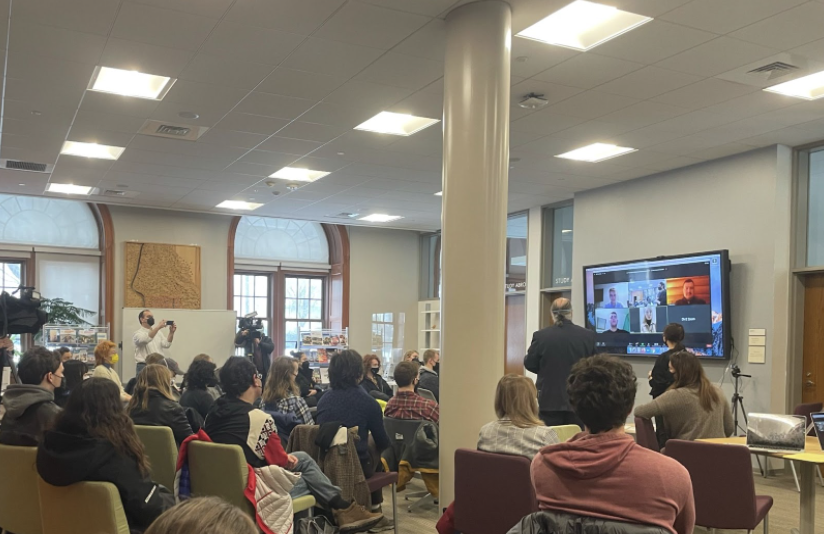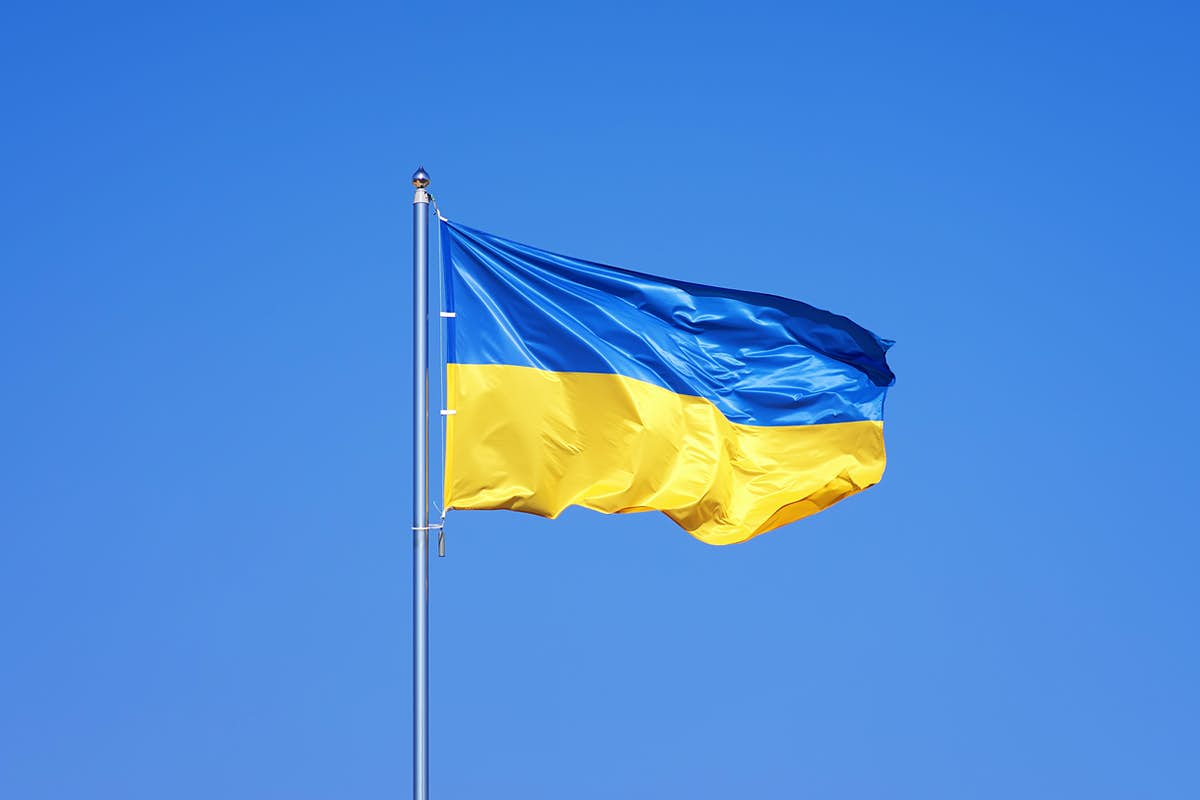
In the early hours of Thursday, Feb. 24, President of Russia Vladimir Putin launched an invasion into Ukraine, breaching international law as bombs dropped on the country of 42 million. In the subsequent days, regular citizens have taken up arms to protect their people and their sovereignty.
Over 4,000 miles away, on the second day of Russia’s invasion, the Wesleyan community gathered to hear Ukrainian University students share their perspectives over Zoom. The panel on Friday, Feb. 25, was the first event in a three-part livestream series co-sponsored by the College of the Environment, the Allbritton Center for the Study of Public Life, the Fries Center for Global Studies, and the Russian, East European and Eurasian Studies Program. The events scheduled for the next two Fridays (March 4 and March 11) will feature Ukrainian journalists and civic leaders.
Associate Professor of Russian, East European, and Eurasian Studies and Director of the Albritton Center for the Study of Public Life Katja Kolcio co-organized the panel with Professor of Earth and Environmental Studies and Director of the College of the Environment Barry Chernoff. Chernoff and Kolcio have co-taught a course called “Ukraine and Its Environment” several times in which students travel to Ukraine and spend two weeks learning alongside Ukrainian students. Kolcio is Ukrainian-American, and has spent years working with Ukrainians affected by the war, using somatics and movement to promote psycho-social wellness. Kolcio was responsible for facilitating contact with panel participants. Planning for the panel began two weeks ago, before the invasion had even happened, but even amid the war, the panelists took time out of their days to speak with University students.
Julia Kulchytska ’24, who is from Sambir, a town in the Lviv region of Ukraine, translated for some of the panelists. While Kulchytska says Lviv is safer than other places in Ukraine, Kulchytska’s family still has to deal with Russian bombings. Kulchytska will continue translating at the next two panels, and is co-leading a rally for solidarity with Ukraine this Friday at 4:30 p.m. outside of Usdan University Center with Lera Svirydzenka ’25, Kseniia Guliaeva ’25, and Kiryl Beliauski ’23.
“At first, I was a bit broken,” Kulchytska said. “But now I’m just in this fight mode where I need to get myself together and do something here.”
Defending Ukraine
Russian troops have targeted civilians throughout their invasion, attacking preschools, hospitals, and residential areas.
“No one can pretend that is okay, or that anyone (including Ukrainians) should just live under those conditions,” Kolcio wrote in an email to The Argus.

Panelist Masha Ostashko is a university student in Dnipro, and works around the clock to supply aid to soldiers and refugees. Kulchytska translated for Ostashko, who said she believes fighting back against Russia is the only way forward.
“People realize that [fighting] and defending their own land is the only way to go if we want to live under the blue and yellow flag,” Ostashcko said. “It’s really important to point out that the war has been going on for like eight years and just yesterday got to be official.”
Ukrainians have faced oppression from Russia throughout their history. During the Holodomor in the 1930s, Soviets starved eight million Ukrainians, and imprisoned political dissidents, artists, and writers throughout their occupation during the twentieth century. In the eight years since Russia’s annexation of Crimea in 2014, Putin’s forces have killed an estimated 15,000 Ukrainians in an active war. The panelists said the world ignored these acts.
Panelist Melaniya Podolyak, a Master’s student at Ukrainian Catholic University, is a civic activist currently raising money, collecting materials, and organizing for the Ukrainian military.
“15,000 dead [since 2014],” Podolyak said. “I’ve known at least thirty of them, ten of them I could call my friends. I’ve sent the best I have to Kyiv right now and they’re battling…. We’re a nation of survivors. We are very successfully killing off very many Russian soldiers as of now. As of three o’clock [today] we have neutralized 2,800 Russian military personnel, that is not even close to how little our losses are.”
Panelists emphasized that Ukrainians know how to fight for themselves and support each other.
“In the past fifteen minutes, Ukrainian people have sent a quarter of a million hryvnias [Ukrainian currency] to my bank account so I could supply my military units with ammunition, with helmets, with anything they need,” Podolyak said. “Ukrainian people who are not rich—we’re not a rich nation of rich people—but if Ukrainian people can send some girl they don’t know (but they just trust her) a quarter of a million hryvnias in a couple of minutes, just to basically protect the values of the free world, the values of the West, then I would think that the Western world should do the same.”
Foreign Action
Panelists discussed the sanctions enacted by several countries on Russia and emphasized the importance of economic pressure. Panelist Roman Stasiuk, a Ukrainian bachelor’s student, said he hopes President Biden will enact greater sanctions, terminate activities with Russian banks, and discontinue flights to and from Russia.
“I would like to ask President Biden to cut Russia off of [the] Swift system, to stop or limit any trade [with this] aggressor, and to impose personal sanctions,” Stasiuk said.
Panelist Oleksii Diatlov, a student at Ukrainian Catholic University and veteran of the Russian-Ukrainian war, said that while sanctions are important, he believes that other actions are needed. Kulchytska related Diatlov’s message, translating from Ukrainian into English.
“Oleksii understands that it is a very hard political decision to send American troops to Ukraine, and he wants to say that we do not need that,” Kulchytska said. “There are a lot of people who are ready to fight and kill Russian soldiers.”
While panelists say that foreign help in some areas—donations, funding the military, and safe airspace—is essential, they emphasize that this is Ukraine’s battle.
“We cannot request other countries [to fight] this battle for us, and we are very aware that that could have absolutely devastating consequences for every country,” Podolyak said. “Need I remind you, Russia is a nuclear power. So we have to [fight] this alone, sadly. That’s just the reality of it. I wish it was different.”
Russia has one of the most powerful militaries in the world, and an estimated 190,000 Russian troops are currently in or surrounding Ukraine. Panelist Yuriy Lomikovskyi, a student at Ukrainian Catholic University, hoped for action from the West.
“Putin will never stop,” Lomikovskyi said. “[There] should be this united position of the West. But I wouldn’t like to ask why, I would like to ask when. There is no time for ‘why,’ it’s just time to [take] action and help Ukraine.”
While there are plenty of Ukrainian humanitarian aid organizations to donate to, Kulchytska emphasized the importance of funding the military. If Ukraine falls, she says, there will be major threats to the democratic world.
“Help for humanitarian organizations is very important, but you have to solve the root problem, not the consequences of it,” Kulchytska said.
Panelists said that holding out on Russia to make a moral decision and end the war isn’t realistic: Diatlov pointed out that Putin’s ideologies are popular and widespread in Russia, despite recent pro-democracy protests in Russia. Diatlov and Podolyak explained that diplomacy with Russia has not worked to end conflict in the past and that it will not work now.
“I hope [Russia] backs off, not because they are so humanitarian and so democratic. I want them to be scared,” Podolyak said. “I want them to run.”
Wesleyan Community Reflects
Looking out at the room of students and faculty over Zoom, Stasiuk stressed that American students must do all they can to help Ukraine. He also wishes that academic communities all over the world would make statements in support of Ukraine.
“It is difficult to overestimate the influence of academic societies on the social [and] political life in different countries around the world,” Stasiuk said. “Demonstrate your position, talk with your friends and with your family about the situation in Ukraine, [give] them [an] understanding that [this] is important.”
Kulchytska added that many Wesleyan alumni are in governmental positions, and that talking about Ukraine and focusing on reliable information nudges people to take action.
“The attention the Wesleyan student body has given to the war in Ukraine is far from enough,” panel attendee Hanson Hairihan ’22 wrote in an email to The Argus. “Most of the panelists were university students just like us until three days ago.”
Chernoff reflected on the power of young Ukrainians.
“It’s the young people who are driving the system [in Ukraine],” Chernoff said. “[The panelists] had to be in their early twenties, and [some] had been serving in the eight years war over there; they’ve been [in] combat for seven years.”
Panel attendee Abby Nicholson ’23 said that talking to Ukrainian students her own age helped her understand the reality in Ukraine.
“Hearing from college students was very impactful because I think it brings the whole thing a little [closer] to home,” Nicholson said. “I thought about what it would be like in that situation.”
Kolcio said contact with people in Ukraine is important in humanizing the conflict. Professor of Government and Russian, East European, and Eurasian Studies Peter Rutland, who specializes in Russian politics, also weighed in.
“Direct contacts give encouragement to Ukrainians who are fighting for their freedom,” Rutland wrote in an email to the Argus. “That phrase is not an empty cliche, or a cover for global capitalist interests. It is a reality.”
Hairihan pointed out that many people, both inside and outside of the Wesleyan community, claim that the push for Western intervention is based in advancing capitalism and a Western World order, even though this does not negate the trauma of war that Ukrainians are experiencing.
“These panelists understand and are experiencing the tragic consequences of war, which is sadly not a consensus among many of the people I personally know,” Hairihan wrote. “You know, this is a geopolitical crisis, but you really don’t have to be a geopolitical scientist and understand every nitty-gritty of the political context to at least try to feel for the Ukrainian people.”
Kulchytska said that in addition to thinking about foreign aid, it’s important to place Ukraine and the Ukrainian people—and their strength—at the center of conversations about the conflict.
“Maybe a lot Americans consider this [to be] the resurrection of [the] Cold War where Ukraine is just a small player and this comes to a big fight between America and Russia,” Kulchytska said. “Ukraine as a nation is very strong and wants to be distinct. It’s not just about America imposing its capitalism or Russia imposing a resurrection of the Soviet Union.”
Before logging off Zoom, Lomikovskyi left the University with words of hope and unity.
“Just know that we won’t lose,” Lomikovskyi said. “We are fighting on our land, and we aren’t going anywhere from here. At the same time, remember that we are a united democratic world and we can make [an] impact… Thank you for listening to us here, and just keep together. We are strong.”
Halle Newman can be reached at hnewman@wesleyan.edu.


Leave a Reply